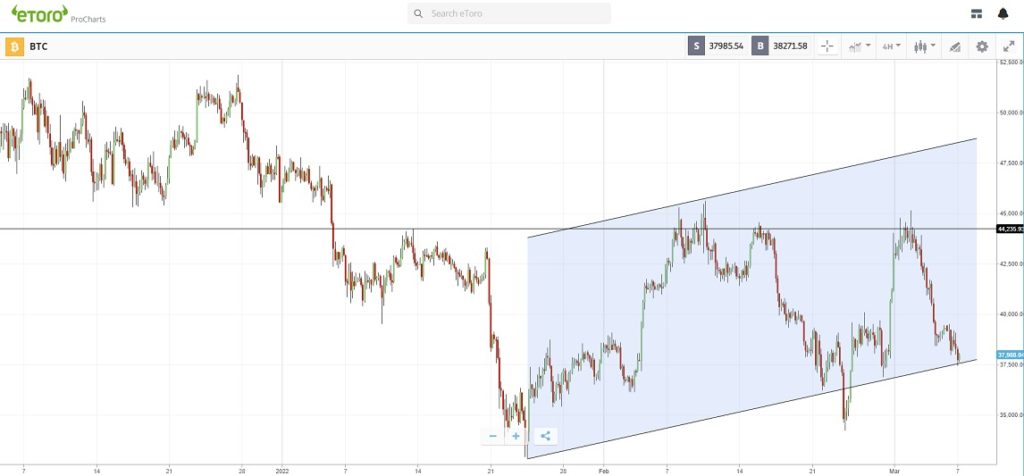Institutions load up amid uncertainty as war continues
Bitcoin greeted March with a massive rally, jumping by nearly 20% last Monday to touch $45K before shedding the gains to settle around $38K.
The sudden leap saw Bitcoin briefly break free from its recent correlation with the S&P 500, and is widely thought to have been driven by speculation that financial sanctions and a falling ruble could drive Russians towards crypto. However, data suggests that institutions could be responsible for the buying pressure. Analytics provider Glassnode reports that traditional firms such as Ark and Morgan Stanley have been making big purchases of Bitcoin-related investment vehicles.

Meanwhile, most altcoins are showing small losses. One of the biggest winners is ATOM, which rose 6% on optimism around the Cosmos ecosystem, while YFI, the token of Yearn Finance, is down 6% after leading developer Andre Cronje announced his departure from DeFi.
This Week’s Highlights
– Ukraine leads global surge in crypto adoption
– Bitcoin overtakes ruble as Russians look towards crypto
– eToro lists Storj, Gala, Balancer and Loopring
Ukraine leads global surge in national crypto adoption
Crypto donations flooding into Ukraine have reached a high watermark of $63 million, demonstrating the power of the asset class as a fundraising tool.
In response to the popularity of crypto as a medium of donation, Ukraine has ramped up its efforts yet further, accepting more cryptoassets, including Dogecoin, and exploring plans for crypto-native fundraising incentives including airdrops and NFTs.
As the world is watching Ukraine, other countries are also adopting crypto. The Swiss city of Lugano has made Bitcoin and Tether legal tender, Tonga has set out a four-step plan to make bitcoin legal tender, and Mexico is working towards legalizing Bitcoin.
Bitcoin overtakes ruble as Russians look towards crypto
As the Russian currency sinks under the weight of Western sanctions, Bitcoin has gained a higher market capitalization than the ruble.
This coincides with a spike in Bitcoin trading volume in Russia. Ruble-denominated Bitcoin volumes hit a new all-time high in Russia on Tuesday after the EU, Japan, the United States, and the UK imposed sanctions to disconnect seven major Russian banks from the SWIFT interbank messaging service.
On the other side of the conflict, Ukrainians are turning to crypto, following a limitation of e-money transfers and cash withdrawals by the central bank in response to the Russian invasion. Last week also saw a precipitous rise in Bitcoin trading volume against Ukraine’s native currency, the hryvnia.
eToro lists Storj, Gala, Balancer and Loopring
eToro’s expansion of supported cryptoassets continues with the listing of STORJ, GALA, BAL and LRC.
- Balancer is the governance token for the Balancer Protocol, and is a decentralized exchange protocol built on Ethereum, and based on an automated market maker.
- Storj is a decentralized cloud storage platform built on Ethereum. STORJ is the native token of Storj, and is used to pay for storage services.
- Loopring is a Layer 2 network based on zk-Rollups that enables developers to deploy high-performance decentralized applications, such as exchanges, on Ethereum. LRC is the native token of Loopring.
- Gala is a blockchain-based gaming platform that empowers players to take ownership of in-game items. GALA is the token of the Gala Games Ecosystem.
The listings bring the total number of tradeable cryptoassets available on eToro to 55.
Please note that the new assets are not available to US investors.
Week ahead
The crypto markets look set to continue navigating the crisis in Ukraine, and could be instrumental in how it plays out over the coming week.
In the US, the February consumer price index is due to be released on Thursday, and is expected to show a continued sharp rise in inflation.
Next week, the European Central Bank will announce its decision regarding the interest rate, which is expected to take into account the continued and potentially durable rise in inflation, as well as the cost of the war, both of which are driving market volatility.

